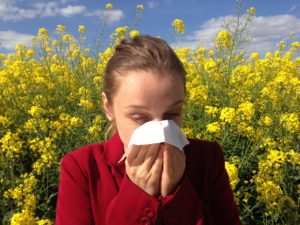Spring is Just Around the Corner, are you Ready for the Hayfever Season?
Spring is a beautiful time of growth and renewal, however unfortunately for seasonal allergy sufferers Springtime can be associated with persistent respiratory symptoms such as allergic rhinitis, eye irritation, lower respiratory tract inflammation and eczema flares. If you suffer from seasonal allergies, it is time to start thinking about your preventative strategies to minimise your immune reactivity. Allergic rhinitis is a common cause of chronic sinusitis and so often the two go hand in hand creating a seemingly never ending cycle of sinus problems for susceptible individuals. Seasonal allergies can also be a trigger for an increase in asthma symptoms due to inflammation and reactivity of the airways.
Perennial allergies (eg. dust mite allergy) are often a persistent cause of respiratory inflammation and can be treated similarly to seasonal allergies, including a focus on reducing exposure at home. De-humidifiers, (dust mites love moist humid environments) dust mite bedding covers, removal/reduction soft furnishings and carpets and using a vacuum with a hepa filter and a motorised head are all useful tools to reduce exposure.

An initial strategy may be to modulate the immune response and stabilise mast cells, i.e., immune cells responsible for the release of histamine and other inflammatory proteins. Vitamin C & Quercetin, Baical Skullcap, Nigella and foods rich in luteolin & apigenin eg. oregano, celery & chamomile are good examples here.
Exposure to diesel fumes and other commonly inhaled chemicals in our modern environment including synthetic perfumes may worsen the respiratory symptoms experienced by allergy sufferers. A 2014 study found that oral supplementation with broccoli sprout extract was found to attenuate an increase in allergic airway reactivity following in allergic subjects following exposure to diesel fumes.
Working foundationally to increase cell mediated immune regulation via support of T regulatory cell activity is key in addressing the underlying factors associated with perennial and seasonal allergies. This may be achieved through a variety of means including therapeutic omega 3 supplementation and Omega 3 rich diets, SPM’s (Selected Modified Pro-resolvins), specific probiotic strains, and herbal medicine eg. Baical Skullcap.
High fibre anti-inflammatory diets such as the Mediterranean diet including a wide diversity of colourful plant foods, nuts, seeds, wholegrains, legumes and oily fish are an essential part of treatment. This dietary approach can support the growth of commensal gut flora to enhance immune modulation and provide systemic anti-inflammatory effects via the production of short chain fatty acids.
For further information or to book a consultation with Amy contact the clinic on 5977 0117 or visit the website peninsulaherbaldispensary.com.au to book online.
References:
Agua-Doce & Graca 2012 ‘Regulatory T Cells and the Control of the Allergic Response.’
https://www.hindawi.com/journals/ja/2012/948901/
Chatzi et al. 2007 ‘Protective effect of fruits, vegetables and the Mediterranean diet on asthma and allergies among children in Crete.’
Kulka et al. 2009 ‘ The Potential of Natural Products as Effective Treatments for Allergic Inflammation: Implications for Allergic Rhinitis.’
Heber et al. 2014 ‘Sulforaphane-rich broccoli sprout extract attenuates nasal allergic response to diesel exhaust particles.’
https://www.ncbi.nlm.nih.gov/pubmed/24287881
Useful websites & reading for further information:
https://www.pollenforecast.com.au/
Healthy Home Healthy Family – Nicole Bilsjma
The Allergy Solution – Leo Galland
This article is intended to be informational only and represents the opinion of the author. It is not intended to be used as medical advice and does not take the place of advice from a qualified health care practitioner in a clinical setting. Please check with your healthcare practitioner before embarking upon any of the treatments discussed.

